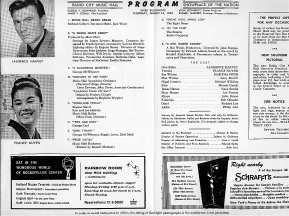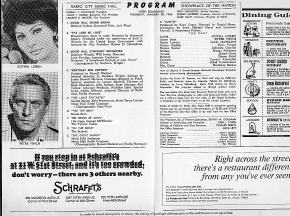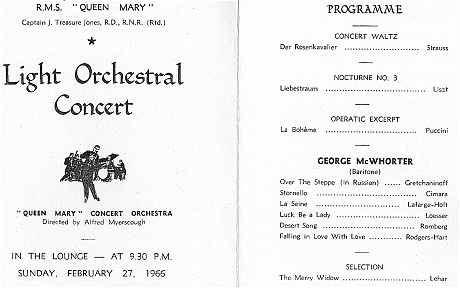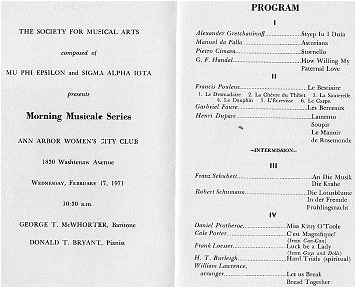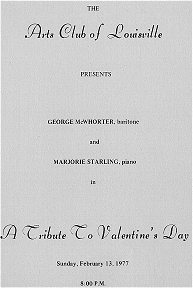
Official Edgar Rice Burroughs Tribute Site Since 1996 ~ Over 15,000 Webpages & Webzines in Archive |

Official Edgar Rice Burroughs Tribute Site Since 1996 ~ Over 15,000 Webpages & Webzines in Archive |
Presents 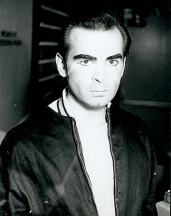
A MUSICAL BIOGRAPHY OF
GEORGE T. McWHORTER
(BARITONE)
(Compiled in March 1980)Mr. McWhorter was born May 10, 1931 in Washington, D.C. where he received his early musical training as a boy soprano at the National Cathedral, under the direction of Paul Callaway (who was later to become Director of the Peabody Institute of Music, Impresario of the National Opera Company, and frequent guest conductor of the National Symphony). At the age of 10 George was featured soloist on a nation-wide Christmas broadcast from the National Cathedral and was soloist of many Cathedral oratorio performances during the next ten years, singing such roles as that of "Peter" in the Washington Premiere of Leo Sowerby's FORSAKEN OF MAN.His first operatic performances were with the Columbia Light Opera Company of Washington (directed by Ethyl Manning) and the Chicago La Scala (Fortune Gallo, Impresario). In 1948, with a vocal scholarship from the National Society of Arts & Letters, donated by Mrs. Cornelius Vanderbilt Whitney, he attended Florida Southern College (Mrs. Whitney's Alma Mater). In 1950 he was baritone soloist in Handel's Messiah with the Gainesville Symphony under the direction of Joseph Lupkiewicz. He graduated with honors in 1951 and gravitated to New York City for advanced vocal study with Paul Althouse, Metropolitan Opera tenor.
In December of 1951 he interrupted his vocal studies to enter the Army at Ft. Dix, New Jersey, where he served as Radio Broadcast Specialist for the Armed Forces Radio Service (staff singer, announcer, newscaster, program chairman), with recorded presentations of his concert programs featured on local ( Philadelphia and Trenton) radio & TV networks. During the final year of Army service, he studied privately at the Curtis Institute of Music with Met baritone Richard Bonelli, and held soloist positions at Philadelphia churches & synagogues. He continued to concertise over the Eastern seaboard, and was released from the Army in December of 1953 with a distinguished service citation for entertainment of hospitalized service men & women.
Moving to Philadelphia, he was hired by concert organist Alexander McCurdy (Head of Organ Departments at Curtis & Westminster Choir College) to sing in his famous Oratorio Chancel Choir which performed a different oratorio each week. (Over 100 oratorios were added to his repertoire during this period.) In 1954, with a voice scholarship to the Eastman School of Music in Rochester, New York, he studied with Met baritone Julius Huehn and performed leading roles in numerous operatic productions at Eastman, including LA CENERENTOLA, MERRY MOUNT, BARBER OF SEVILLE, CARMEN, DON GIOVANNI, DON PASQUALE, EUGENE ONEGIN and others. While still a student at Eastman he was frequent soloist with the Rochester Philharmonic, Eastman-Rochester Symphony Band, Mercury Ballet Company, Chatauqua Symphony (Alberto Rimboni, conductor), Chatauqua Opera (Alfredo Valenti, Impresario), and in oratorio performances sponsored by the American Guild of Organists. During the summers of his Eastman years, he sang operetta & musical comedy roles in stock companies throughout the U.S. and Canada (over 35 productions, each of 2 weeks' duration).
From 1957-59 he studied at the University of Michigan with Metropolitan baritone Chase Baromeo, having won a scholarship from the Oliver Ditson Publishing Company. He was featured soloist in several operatic productions (including BALLO EN MASCHERA, DON GIOVANNI, GIANNI SCHICCHI). During the Michigan summers he was soloist with the Pittsburgh Civic Opera ("Student Prince") and the Detroit Symphony. (He appeared as soloist in Handel's MESSIAH with the Detroit Symphony in December, 1958, Paul Paray conducting.) He graduated with a Master's Degree in Vocal Performance (1959) presenting Schubert's "Die Winterreise" for his degree recital.
In the summer of 1959 he received a Fulbright-Woolley Foreign Study Grant to Paris where he remained for two years as a pupil of baritone Pierre Bernac and studied musicology with Nadia Boulanger. He frequently performed benefit concerts at the American Atelier, Ecole de Musique and the Fondation des Etats-Unis (singing for MONEY was forbidden by the Fulbright Committee!). In 1960, Mlle. Boulanger honored him by selecting him as soloist for the Paris Premiere of Stravinsky's CANTICUM SACRUM (which she conducted with Leon Barzun's Paris Chamber Orchestra). (NOTE: Two years later, when Boulanger appeared as the first woman conductor of the NY Philharmonic in a performance of the Faure REQUIEM & PSALMS of Lili Boulanger, George was engaged to train the Philharmonic chorus in French diction for the performance.)
In the winter of 1960, George returned to America and settled in New York City, continuing his vocal studies with Met baritone Herbert Janssen. For the next 9 years he sang in six seasons with the NY City Center Opera (Julius Rudel, Impressario) in its home and touring companies of Standard Opera, America Opera, and Gilbert & Sullivan seasons. He was featured in City Center productions of musical comedy as well (Agnes DeMille's company of BRIGADOON, the Lerner company of MOST HAPPY FELLA) and appeared at the Lincoln Centre for the Performing Arts in I VESPRI SICIALIANI (Thomas Sherman conducting) and in the Richard Rodgers company of Show Boat (Franz Allers conducting). He gave frequent recitals at New York's TOWN HALL and CARNEGIE HALL, was soloist & Mast of Ceremonies at Radio City Music Hall (where he was filmed on NBC-TV at Christmas, 1966), performed at the American Shakespeare Festival, Ed Sullivan Show, Industrial Shows, toured with the New Pro Musica in the PLAY OF DANIEL, and passed his summers in musical stock companies and soloist on TransAtlantic, TransCaribbean & World cruises for the Swedish-American, Cunard, and United States Steamship Lines.
(In 1969, while touring with the NY Pro Musica, he suffered a partial paralysis of the vocal chords (caused by gout) and was informed by medical specialists that the indisposition, though not permanent, would take two years to heal. He returned to the University of Michigan for additional graduate work while his voice healed. While working full time at Michigan's Rare Book Department, he became fascinated with the field and took an A.M.L.S. in 1972 (the same year that he resumed concertising with full command of his voice). Upon graduation he was offered a faculty appointment to the University of Louisville as Curator of Rare Books and decided to accept, keeping his vocal training and experience as an avocation.
Within several months of his arrival in Louisville, George was contacted by Moritz Bomhard for the K.O.A. He made his Louisville debut with a leading role in the Czech opera JENUFA, and continued to sing roles with the Kentucky Opera for the next three years (BOHEME, TOSCA, TABARRO, CARMINA BURANA). He has appeared in fund raising concerts for the Louisville Fund for the Arts, at local women's clubs, Rotary Clubs, Louisville Arts Club, and on civic concert series in other states. In March, 1980 he performed a leading role in Donizetti's IL CAMPANELLO at the Spalding Auditorium followed by concerts at the Louisville Women's Club.
EDUCATION: B.A., B.M., M.M., A.M.L.S., FULBRIGHT-WOOLLEY (PARIS) RESUME
Professional Memberships: AGMA, AGVA, AFTRA, AEA (parent union)REPERTOIRE:
A: OPERA & OPERETTA: Aida, L'Amore dei Tre Re, L'Arlesiana, Ballad of Baby Doe, Ballo en Maschera, Barber of Seville, Boheme, Boris, Butterfly, Campanello, Carmen, Carmina Burana, Cavalleria Rusticana, Cenerentola, Chocolate Soldier, Consul, Cosi Fan Tutte, Daniel, Desert Song, Dido & Aeneas, Don Carlo, Don Giovanni, Don Pasquale, Elisir D'Amore, Eugene Onegin, Faust, Fidelio, Fledermaus, Gianni Schicchi, Golem, Gondoliers, Iolanthe, Jenufa, Lakme, Louise, Marta, Matrimonio Segreto, Medium, Merry Mount, Mery Widow, Mikado, Mitridate Eupator,, Naughty Marietta, Nightingale, Nozze di Figaro, Oedipus Rex, Pagliacci, Pearl Fishers, Pinafore, Pirates of Penzance, Reingold, Rigoletto, Robin & Marion, Robin Hood, Serva Padrona, Simon Boccanegra, Song of Norway, Student Prince, Tabarro, Tales of Hoffman, Tannhauser, Tosca, Traviata, Trial By Jury, Turandot, Vespri Siciliani, Zauberflote.B: ORATORIO: (only those performed with orchestra are listed)
Bach: B-Minor, Magnificat, Kreuzstab, Sages of Sheba, St. John, St. Matthew
Beethoven: Missa Solemnis
Brahms: Deutsches Requiem
Bruchner: Mass
Debussy: L'Enfant Prodigue
DuBois: Seven Last Words
Dvorak: Stabat Mater
Faure: Requiem
Franck: Mass in A
Gounod: St. Cecilia
Handel: Jeptha, Judas, Messiahn, Samson, St. John
Haydn: Creation
Kodaly: Miss Brevis
Liszt: Christmus
Mendelssohn: Elijah, St. Paul
Mozart: Requiem
Ockeghem: Missa Prolationum
Paray: Joan of Arc Mass
Parker: Hora Novissima
Purvis: Ballad of Judas Iscariot
Rossini: Stabat Mater
Schubert: Mass in G
Sowerby: Forsaken of Man
Stainer: Crucifixion
Stravinsky: Canticum Sacrum
Verdi: Manzoni Requiem
PROGRAMME GALLERY 